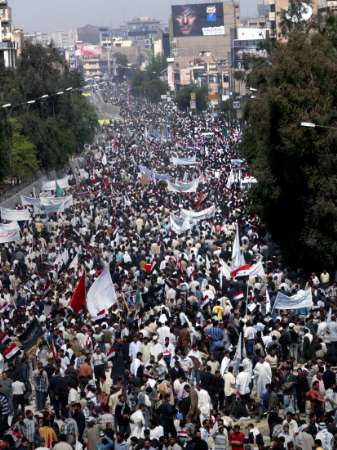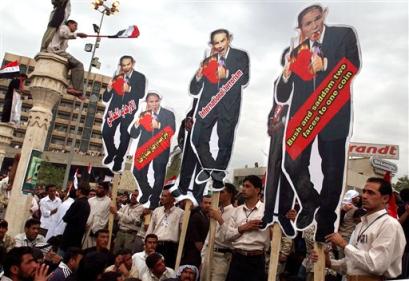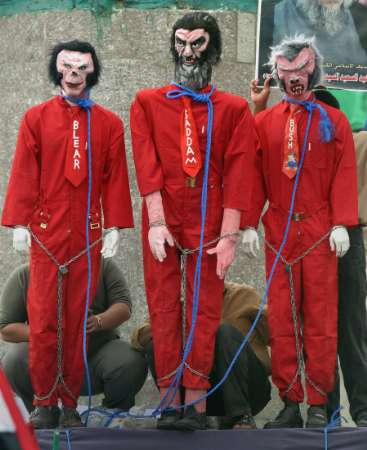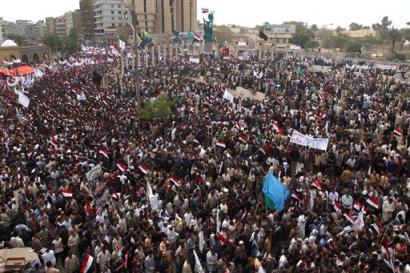From the Open-Publishing Calendar
From the Open-Publishing Newswire
Indybay Feature
Shia protest over US presence in Iraq
Tens of thousands of supporters of Shia cleric Muqtada al-Sadr have marched in Baghdad to denounce the US presence in Iraq and call for a speedy trial of Saddam Hussein on the second anniversary of his overthrow.

----
Thousands of Iraqi Shi'ites loyal to cleric Moqtada al-Sadr hold a protest in Baghdad April 9, 2005. The rally was called on the second anniversary of the fall of Baghdad with protesters demanding an end to the U.S. military presence in Iraq and a speedy trial for former president Saddam Hussein. REUTERS/Ali Jasim
---
Chanting "No, no to the occupiers", tens of thousands of young and old men gathered in the poor Shia district of Sadr City on Saturday to begin a planned peaceful march to al-Firdos Square, the central Baghdad spot where Saddam's statue was torn down two years ago.
Crowds of al-Sadr's supporters from across the country were gathered at the square by mid-morning, waving Iraqi flags and calling out: "No America! No Saddam! Yes to Islam!"
Sunni Muslims were urged by the Association of Muslim Scholars in Iraq, an influential Sunni group, to demonstrate to mark the fall of Saddam and to demand US forces leave Iraq.
Sunni and Shia unite
"Many of our brothers, including Sunnis, have welcomed the call and will take part," said Shaikh Abd al-Hadi al-Daraji, a spokesman for al-Sadr. "We hope it's going to be one million people strong."
Al-Daraji told Aljazeera that protesters also demanded the release of Iraqi prisoners and an end to foreign intervention in Iraq and other Arab countries.
"Iraqis can protect themselves, and those who call on US forces to stay in Iraq contradict themselves," he said.
Followers of al-Sadr from the southern Shia cities of Basra, Amara and Nassiriya travelled hundreds of miles to join the protest, showing the appeal the young cleric can command.
The demonstration was expected to be the largest since the 30 January election and the first since the new government began to take shape.
Al-Sadr, a low-ranking cleric in his mid-30s, oversees a force called the Mahdi Army that is thought to be several thousand strong. He led two uprisings against US forces last year, sparking weeks of fighting.
Baghdad shutdown
Iraqi security forces shut down central Baghdad ahead of the demonstration, but were not expecting problems.
"We're quite relaxed about it," said Sabah Qadhim, a spokesman for the Interior Ministry, which is overseeing security.
"The demonstration is supporting what the Iraqi people and the Iraqi government have said they want - a trial for Saddam and the departure of US forces," he said.
"We don't think this is going to be a huge number - it's not going to be a million-man march, but we are taking precautions as we have done over recent months."
US forces were not in evidence on the streets, but Qadhim said they could be called in to support if needed.
Other marches were held across the country to demand that the United States set a timetable for its withdrawal.
In the central city of Ramadi, thousands of protesters demonstrated in al-Sufayaa neighbourhood and at al-Anbar University, demanding that US-led forces set a withdrawal date.
Anti US-sentiment
"This huge gathering shows the Iraqi people have the strength and faith to protect their country and liberate it from the occupiers," said protester 26-year-old Ahmad Abid, who sells spare car parts.
US officials have said they will not set a timetable for withdrawal, promising to stay until Iraqi forces are able to secure the country.
Mimicking the famous images of US soldiers and Iraqis pulling down a statue of Saddam as Baghdad fell, protesters toppled effigies of US President George Bush, British Prime Minister Tony Blair and Saddam - all dressed in red Iraqi prison jumpsuits that signified they had been condemned to death sentences.
Other effigies of Bush and Saddam were burned in the street.
"Force the occupation to leave from our country," one banner read in English.
Al-Firdos Square has become a central rallying place for Iraqis since Saddam's overthrow two years ago. US forces last year shut down the square, sealing it off with razor wire, to prevent people massing on the first anniversary.
Government formation
The protest comes as efforts are being made to complete the formation of a government nearly 10 weeks since the election. Earlier, a president and two vice-presidents were named, along with a prime minister.
But the prime minister, Shia leader Ibrahim al-Jafari, is still working on his cabinet and has said it could take him up to two weeks before it is named.
Late on Friday, a senior al-Sadr official who had arrived from Karbala to take part in the protest was shot and killed in the New Baghdad neighbourhood. Fadil al-Shawky died in the attack on his car. Two others were wounded.
http://english.aljazeera.net/NR/exeres/F886ED14-806A-4D3A-A09E-57B1CF1B5B83.htm
Thousands of Iraqi Shi'ites loyal to cleric Moqtada al-Sadr hold a protest in Baghdad April 9, 2005. The rally was called on the second anniversary of the fall of Baghdad with protesters demanding an end to the U.S. military presence in Iraq and a speedy trial for former president Saddam Hussein. REUTERS/Ali Jasim
---
Chanting "No, no to the occupiers", tens of thousands of young and old men gathered in the poor Shia district of Sadr City on Saturday to begin a planned peaceful march to al-Firdos Square, the central Baghdad spot where Saddam's statue was torn down two years ago.
Crowds of al-Sadr's supporters from across the country were gathered at the square by mid-morning, waving Iraqi flags and calling out: "No America! No Saddam! Yes to Islam!"
Sunni Muslims were urged by the Association of Muslim Scholars in Iraq, an influential Sunni group, to demonstrate to mark the fall of Saddam and to demand US forces leave Iraq.
Sunni and Shia unite
"Many of our brothers, including Sunnis, have welcomed the call and will take part," said Shaikh Abd al-Hadi al-Daraji, a spokesman for al-Sadr. "We hope it's going to be one million people strong."
Al-Daraji told Aljazeera that protesters also demanded the release of Iraqi prisoners and an end to foreign intervention in Iraq and other Arab countries.
"Iraqis can protect themselves, and those who call on US forces to stay in Iraq contradict themselves," he said.
Followers of al-Sadr from the southern Shia cities of Basra, Amara and Nassiriya travelled hundreds of miles to join the protest, showing the appeal the young cleric can command.
The demonstration was expected to be the largest since the 30 January election and the first since the new government began to take shape.
Al-Sadr, a low-ranking cleric in his mid-30s, oversees a force called the Mahdi Army that is thought to be several thousand strong. He led two uprisings against US forces last year, sparking weeks of fighting.
Baghdad shutdown
Iraqi security forces shut down central Baghdad ahead of the demonstration, but were not expecting problems.
"We're quite relaxed about it," said Sabah Qadhim, a spokesman for the Interior Ministry, which is overseeing security.
"The demonstration is supporting what the Iraqi people and the Iraqi government have said they want - a trial for Saddam and the departure of US forces," he said.
"We don't think this is going to be a huge number - it's not going to be a million-man march, but we are taking precautions as we have done over recent months."
US forces were not in evidence on the streets, but Qadhim said they could be called in to support if needed.
Other marches were held across the country to demand that the United States set a timetable for its withdrawal.
In the central city of Ramadi, thousands of protesters demonstrated in al-Sufayaa neighbourhood and at al-Anbar University, demanding that US-led forces set a withdrawal date.
Anti US-sentiment
"This huge gathering shows the Iraqi people have the strength and faith to protect their country and liberate it from the occupiers," said protester 26-year-old Ahmad Abid, who sells spare car parts.
US officials have said they will not set a timetable for withdrawal, promising to stay until Iraqi forces are able to secure the country.
Mimicking the famous images of US soldiers and Iraqis pulling down a statue of Saddam as Baghdad fell, protesters toppled effigies of US President George Bush, British Prime Minister Tony Blair and Saddam - all dressed in red Iraqi prison jumpsuits that signified they had been condemned to death sentences.
Other effigies of Bush and Saddam were burned in the street.
"Force the occupation to leave from our country," one banner read in English.
Al-Firdos Square has become a central rallying place for Iraqis since Saddam's overthrow two years ago. US forces last year shut down the square, sealing it off with razor wire, to prevent people massing on the first anniversary.
Government formation
The protest comes as efforts are being made to complete the formation of a government nearly 10 weeks since the election. Earlier, a president and two vice-presidents were named, along with a prime minister.
But the prime minister, Shia leader Ibrahim al-Jafari, is still working on his cabinet and has said it could take him up to two weeks before it is named.
Late on Friday, a senior al-Sadr official who had arrived from Karbala to take part in the protest was shot and killed in the New Baghdad neighbourhood. Fadil al-Shawky died in the attack on his car. Two others were wounded.
http://english.aljazeera.net/NR/exeres/F886ED14-806A-4D3A-A09E-57B1CF1B5B83.htm



We are 100% volunteer and depend on your participation to sustain our efforts!
Get Involved
If you'd like to help with maintaining or developing the website, contact us.
Publish
Publish your stories and upcoming events on Indybay.
Topics
More
Search Indybay's Archives
Advanced Search
►
▼
IMC Network



Inaam Tadra, student, 24
Our biggest problem is the loss of security. We need to re-establish security in the country. Hopefully the new government will be strong and united, so they can start the process.
The Americans brought the terrorists here. They weren't here before. And I don't believe the terrorists are Muslims.
The Americans search our houses. With their aggressive behavior, they are turning the Iraqis against them.
Images by Johan Spanner/Polaris/Eyevine for BBC News
http://news.bbc.co.uk/1/shared/spl/hi/picture_gallery/05/in_pictures_iraqi_lives_two_years_after_saddam/html/10.stm
Demonstrators loyal to Shia cleric Moqtada Sadr rallied in the square where the ousted Iraqi leader's statue was toppled in 2003.
The protest was the largest since the 30 January elections.
Earlier, insurgents killed 15 Iraqi soldiers travelling in a convoy south of the capital, police said.
'No to the occupiers'
Mr Sadr's supporters streamed from the Sadr City district to Firdos Square, where the statue was brought down on 9 April 2003, symbolically marking the end of Saddam Hussein's regime.
Protesters chanted anti-Western slogans such as "No, no to the occupiers", and "No America! No Saddam! Yes to Islam!"
The square was packed with demonstrators waving Iraqi flags and holding aloft effigies of US President George W Bush, UK Prime Minister Tony Blair and Saddam Hussein.
Iraqi security forces kept watch, while US troops were out of sight. There were no reports of violence
"I came from Sadr City to demand a timetable for the withdrawal of the occupation," one protester, named Abbas, was quoted by Reuters news agency as saying.
"The Americans wanted time and we gave them time, now we want to rule ourselves," he said.
Moqtada Sadr did not attend the rally. He is believed to have remained in Najaf since agreeing a truce with the US following clashes between US-led forces and Mr Sadr's Mehdi Army militia last August.
'Triangle of death'
Earlier on Saturday, the bodies of 15 Iraqi soldiers were found near the town of Latifiya, in a lawless area known as the "triangle of death".
There are conflicting accounts of how the soldiers died.
Police in the nearby town of Mahmudiya told Reuters news agency that gunmen forced the soldiers' truck to stop before shooting and killing them.
However, an Iraqi defence ministry official told AFP news agency that they were blown up by a roadside bomb.
http://news.bbc.co.uk/2/hi/middle_east/4429137.stm